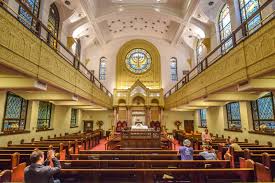 They are our neighbors, our relatives, our coworkers and our friends…. They are the 35% of Catholics who do not go to Mass regularly or practice their faith, but still self-identify as Catholic. The question is: Why?
They are our neighbors, our relatives, our coworkers and our friends…. They are the 35% of Catholics who do not go to Mass regularly or practice their faith, but still self-identify as Catholic. The question is: Why?
Fr. Thomas Gaunt, S.J., addressed the 2017 Convocation of Catholic leaders to explain the changing landscape of the Church. He introduced us to research that the United States Conference of Catholic Bishops had done to try to understand what it meant to be Catholic in America. The research showed that in a church of 75 million American Catholics, 25 million do not go to Mass regularly, but still had a strong interior need to self-identify as Catholics.
What is the key that can help lapsed Catholics live the faith they see themselves as a part of, but choose not to participate in? The answer to that question is where the key to the new evangelization lies.
Often when we describe ourselves as ‘Catholics’ we are thinking of the things we believe and do. What doesn’t come to mind as quickly is who we are, and who God is.
I am not a theologian, but here is my theory. It’s because of baptism. When an infant is baptized, God pours his fierce, powerful, transforming love into the soul that He claims as His own child. We often see the power of this sacrament in adult converts who become zealous for their adopted faith and live a radical Christianity. It is the same God, the same love, the same powerful identity that is created in the infant, and never goes away, even through years of neglect and indifference. We always remain always God’s beloved child because He remains the faithful Father. Being Catholic is less about adhering to an organization and more about being a member of a Family. We can’t stop being Catholic, because we can’t stop being the child of our Father who has marked us indelibly as His own in our baptism, and won’t let go. The sacrament of baptism is a moment when God burns his image into us and our identity. It implies that Catholicism is something deeper than ‘what we do’ in the Church and it shows that God never, ever gives up on us, no matter how many years we have given up on him.
It would be as if one of my own children rejected our family. It doesn’t make him less my child, make him less of a Rivard, or change his DNA.
Something remains. Deep down in our spiritual DNA, we are children of God. Under the contrary life choices, the lack of catechesis, the wounds, and the rejection of truths, there remains an indelible mark. “I am Catholic.” The still small voice of God in our souls that whispers with authority, ‘You are Mine.” is ignorable but ever-present and still shapes our identity. The new evangelization depends on apostles who allow Christ to awaken them to that voice. We need to show people the ways they resemble their Father, the family traits that prove to them who they are. We need to tell them the ways we see their Catholic identity in their lives through the virtues they have, the love of things sacred, the way they care for those close to them. We have the chance to show them that those aren’t random choices, those are part of their Catholicism. And then we need to invite and accompany them in discovering more of their heritage and living it.
Fr Gaunt and the bishops who spoke at the convocation helped us to gently shift our paradigm of seeing Catholics who have fallen away from practicing the faith as non-Catholics to seeing them as God’s own children who never cease to be His no matter what their moral choices are. They are a vast periphery that Evangelii Gaudium asks us to reach and bring to encounter Mercy himself. We don’t have to reach far. The periphery of the 35% is all around us.
